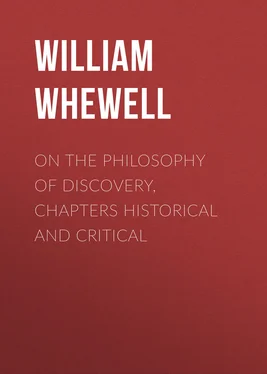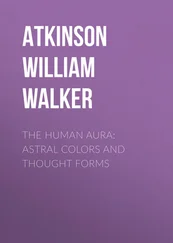William Whewell - On the Philosophy of Discovery, Chapters Historical and Critical
Здесь есть возможность читать онлайн «William Whewell - On the Philosophy of Discovery, Chapters Historical and Critical» — ознакомительный отрывок электронной книги совершенно бесплатно, а после прочтения отрывка купить полную версию. В некоторых случаях можно слушать аудио, скачать через торрент в формате fb2 и присутствует краткое содержание. Жанр: foreign_prose, foreign_religion, Философия, foreign_psychology, foreign_antique, на английском языке. Описание произведения, (предисловие) а так же отзывы посетителей доступны на портале библиотеки ЛибКат.
- Название:On the Philosophy of Discovery, Chapters Historical and Critical
- Автор:
- Жанр:
- Год:неизвестен
- ISBN:нет данных
- Рейтинг книги:5 / 5. Голосов: 1
-
Избранное:Добавить в избранное
- Отзывы:
-
Ваша оценка:
- 100
- 1
- 2
- 3
- 4
- 5
On the Philosophy of Discovery, Chapters Historical and Critical: краткое содержание, описание и аннотация
Предлагаем к чтению аннотацию, описание, краткое содержание или предисловие (зависит от того, что написал сам автор книги «On the Philosophy of Discovery, Chapters Historical and Critical»). Если вы не нашли необходимую информацию о книге — напишите в комментариях, мы постараемся отыскать её.
On the Philosophy of Discovery, Chapters Historical and Critical — читать онлайн ознакомительный отрывок
Ниже представлен текст книги, разбитый по страницам. Система сохранения места последней прочитанной страницы, позволяет с удобством читать онлайн бесплатно книгу «On the Philosophy of Discovery, Chapters Historical and Critical», без необходимости каждый раз заново искать на чём Вы остановились. Поставьте закладку, и сможете в любой момент перейти на страницу, на которой закончили чтение.
Интервал:
Закладка:
It is unnecessary to pursue further the reasonings of the Romans on such subjects, and we now proceed to the ages which succeeded the fall of their empire.
CHAPTER VIII.
Arabian Philosophers
I have noticed certain additions to Physical Science made by the Arabians; namely, in Astronomy 45 45 Hist. Ind. Sc. b. iii. c. iv. sect. 8.
. The discovery of the motion of the Sun's Apogee by Albategnius, and the discovery of the Moon's Variation by Aboul-Wefa; and in Optics 46 46 Ibid. b. ix. c. ii.
the assertion of Alhazen that the angle of refraction is not proportional to the angle of incidence, as Ptolemy had supposed: and certain steps in the philosophy of vision. We must also suppose, as the Arabic word alkali reminds us, that the Arabians contributed to lay the foundations of chemistry. The question which we have here to ask is, whether the Arabians made any steps beyond their predecessors in the philosophy of discovery. And to this question, I conceive the answer must be this: that among them as among the Greeks, those who practically observed nature, and especially those who made discoveries in Science, must have had a practical acquaintance with some of the maxims which are exemplified in the formation of Science. To discover that the Apogee of the Sun was 17 degrees distant from the point where Ptolemy had placed it, Albategnius made careful observations, and referred them to the theory of the eccentric, so as to verify or correct that theory. And when, in the eleventh century, Arzachel found the Apogee to be less advanced than Albategnius had found it, he proceeded again to correct the theory by introducing a new movement of the equinoctial points, which was called the Trepidation . It appeared afterwards, however, that, in doing this, he had had too much confidence in the observations of his predecessors, and that no such movement as the Trepidation really existed. In like manner to correct Ptolemy's law of refraction, Alhazen had recourse to experiment: but he did not put his experiments in the form of a Table, as Ptolemy had done. If he had done this, he might possibly have discovered the law of sines, which Snell afterwards discovered.
But though the Arabian philosophers thus, in some cases, observed facts, and referred those facts to general mathematical laws, it does not appear that they were led to put in any new or striking general form such maxims as this: That the progress of Science consists in the exact observation of facts and in colligating them by ideas. Those of them who were dissatisfied with the existing philosophy as barren and useless (for instance Algazel 47 47 See Hist. Ind. Sc. b. iv. c. i.
), were led to point at the faults and contradictions of that philosophy, but did not attempt, so far as I know, to substitute for it anything better. If they rejected Aristotle's Organon , they did not attempt to construct a new Organon for themselves.
Indeed they do not appear even to have had sufficient confidence in the real truth of the astronomical theories which they had adopted from the Greeks, always to correct and extend those where their observations showed that they required correction and extension. Sometimes they did this, but not generally enough. When Arzachel found by observation the Apogee of the Sun to be situated too far back, he ventured to correct Ptolemy's statement of its motion. But when Aboul-Wefa had really discovered the Variation of the Moon's motion, he did not express it by means of an epicycle. If he had done so, he would have made it unnecessary for Tycho Brahe at a later period to make the same discovery.
The moral of this incident is the same moral which we have perpetually to note as taught us at every step by the history of Science:—namely, the necessity of constant, careful and exact observation of Facts; and the advantage of devising a Theory, (even if it have to be afterwards rejected,) by which the Facts shall be bound together into a coherent whole.
CHAPTER IX.
The Schoolmen of the Middle Ages
In the History of the Sciences I have devoted a Book to the state of Science in the middle ages, and have endeavoured to analyse the intellectual defects of that period. Among the characteristic features of the human mind during those times, I have noticed Indistinctness of Ideas, a Commentatorial Spirit, Mysticism, and Dogmatism. The account there given of this portion of the history of man belongs, in reality, rather to the History of Ideas than to the History of Progressive Science. For, as we have there remarked, theoretical Science was, during the period of which we speak, almost entirely stationary; and the investigation of the causes of such a state of things may be considered as a part of that review in which we are now engaged, of the vicissitudes of man's acquaintance with the methods of discovery. But when we offered to the world a history of science, to leave so large a chasm unexplained, would have made the series of events seem defective and broken; and the survey of the Middle Ages was therefore inserted. I would beg to refer to that portion of the former work the reader who wishes for information in addition to what is here given.
The Indistinctness of Ideas and the Commentatorial Disposition of those ages have already been here brought under our notice. Viewed with reference to the opposition between Experience and Ideas, on which point, as we have said, the succession of opinions in a great measure turns, it is clear that the commentatorial method belongs to the ideal side of the question: for the commentator seeks for such knowledge as he values, by analysing and illustrating what his author has said; and, content with this material of speculation, does not desire to add to it new stores of experience and observation. And with regard to the two other features in the character which we gave to those ages, we may observe that Dogmatism demands for philosophical theories the submission of mind, due to those revealed religious doctrines which are to guide our conduct and direct our hopes: while Mysticism elevates ideas into realities, and offers them to us as the objects of our religious regard. Thus the Mysticism of the middle ages and their Dogmatism alike arose from not discriminating the offices of theoretical and practical philosophy. Mysticism claimed for ideas the dignity and reality of principles of moral action and religious hope: Dogmatism imposed theoretical opinions respecting speculative points with the imperative tone of rules of conduct and faith.
If, however, the opposite claims of theory and practice interfered with the progress of science by the confusion they thus occasioned, they did so far more by drawing men away altogether from mere physical speculations. The Christian religion, with its precepts, its hopes, and its promises, became the leading subject of men's thoughts; and the great active truths thus revealed, and the duties thus enjoined, made all inquiries of mere curiosity appear frivolous and unworthy of man. The Fathers of the Church sometimes philosophized ill; but far more commonly they were too intent upon the great lessons which they had to teach, respecting man's situation in the eyes of his Heavenly Master, to philosophize at all respecting things remote from the business of life and of no importance in man's spiritual concerns.
Yet man has his intellectual as well as his spiritual wants. He has faculties which demand systems and reasons, as well as precepts and promises. The Christian doctor, who knew so much more than the heathen philosopher respecting the Creator and Governor of the universe, was not long content to know or to teach less, respecting the universe itself. While it was still maintained that Theology was the only really important study, Theology was so extended and so fashioned as to include all other knowledge: and after no long time, the Fathers of the Church themselves became the authors of systems of universal knowledge.
Читать дальшеИнтервал:
Закладка:
Похожие книги на «On the Philosophy of Discovery, Chapters Historical and Critical»
Представляем Вашему вниманию похожие книги на «On the Philosophy of Discovery, Chapters Historical and Critical» списком для выбора. Мы отобрали схожую по названию и смыслу литературу в надежде предоставить читателям больше вариантов отыскать новые, интересные, ещё непрочитанные произведения.
Обсуждение, отзывы о книге «On the Philosophy of Discovery, Chapters Historical and Critical» и просто собственные мнения читателей. Оставьте ваши комментарии, напишите, что Вы думаете о произведении, его смысле или главных героях. Укажите что конкретно понравилось, а что нет, и почему Вы так считаете.












